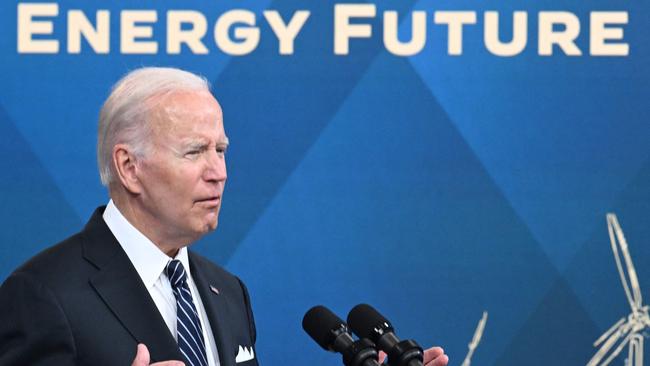Ukraine invasion: Sanctions, not war caused petrol hike: admits Joe Biden
Joe Biden has conceded his government knew placing sanctions on Russia over the Ukraine invasion would increase petrol prices.

Joe Biden has conceded US-led sanctions on Russia have significantly worsened the surge in petrol prices across the US rather than Vladimir Putin’s invasion of Ukraine, as he called on Congress to suspend a petrol excise tax for 90 days, a proposal former president Barack Obama once described as a gimmick.
Speaking a few hours after the Chairman of the Federal Reserve Jerome Powell said his plan to ratchet up interest rates to fight inflation could tip the US into recession, Mr Biden said soaring petrol prices were an inevitable result of US and the European bans on Russian energy exports.
“It wasn’t just Putin’s invasion … we cut [Russia’s energy] off knowing we would see higher gas prices,” he said, speaking at the White House on Wednesday (Thursday AEST) to make the case for a three-month suspension of a federal 18.3 cent per gallon petrol tax.
“The price of oil wouldn’t have spiked the way it has,” he added while imploring US oil giants to increase oil and petrol production “rather than by their back stock”.
The Biden administration has been under intense political pressure for weeks to help Americans struggling with record inflation, including average petrol prices across the US of US$5 a gallon (around $1.90 a litre), more than double the level of a year ago.
“Are you saying we’d rather have lower gas prices and Putin’s iron fist in Europe?” the president asked, arguing the US had no choice but to impose sweeping economic sanctions on Russia for invading Ukraine, which have helped push the US inflation rate to 8.6 per cent in May, the highest in 41 years.
Vladimir Putin in a speech last week in St Petersburg argued sanctions had swollen Russia’s coffers and hurt European families with much higher energy prices, mocking the idea that he, rather than sanctions, had fuelled the historic surge in energy prices.
“We all hear about so called Putin inflation in the West,” Mr Putin said. “When I see this, I always think: Who’s this meant for, this stupidity? For someone who doesn’t know how to read or write.”
Suspending the federal excise tax, which would cost the federal budget about US$10bn, the White House said, will face an uphill battle in Congress, where even Democrats, including House Speaker Nancy Pelosi, have expressed scepticism.
“I‘m not a yes right now, that’s for sure,” Democrat Senator Joe Manchin said a little before the president spoke, reflecting concerns expressed in 2008 by Barack Obama who called the petrol tax holidays a gimmick.
Economists have expressed reservations over whether the full tax reduction or even most of it would be passed onto consumers.
“It’s not the best idea. It’s bullish energy prices because it’s reducing the price to the consumer, and the law of demand says they’re going to consume more if you take down the price,” Goldman Sachs commodity analyst Jeff Currie said earlier in the day.
Mr Biden has variously blamed Vladimir Putin’s invasion of Ukraine and profiteering by oil and shipping companies for soaring US inflation, which has triggered a series of outsized interest rate increase by the Federal Reserve this year in a bid to contain it.
Mr Powell, speaking separately on the first of two days of Congressional testimony, said a US recession in the next 12 months was “certainly a possibility”, reflecting mounting concern the world’s largest economy was poised for recession.
“We are not trying to provoke and do not think we will need to provoke a recession, but we do think it’s absolutely essential” to bring down inflation, Mr Powell said.
Goldman Sachs economists doubled their expected probability of a recession in the next 12 months to 30 per cent on Tuesday.
“No, inflation was high before — certainly before the war in Ukraine broke out,” Mr Powell also said in testimony, when asked whether the war was the primary cause of inflation, which had risen to 7 per cent in December, two month before Russia invasion.
Separately, one of Mr Powell’s colleagues on the Federal Reserve Board, Patrick Harker, said he would be supporting an extra 50 or 75 basis points of interest rate increases when the Fed next considers policy in July. “We could have a couple of negative quarters,” he told Yahoo’s finance channel.




To join the conversation, please log in. Don't have an account? Register
Join the conversation, you are commenting as Logout